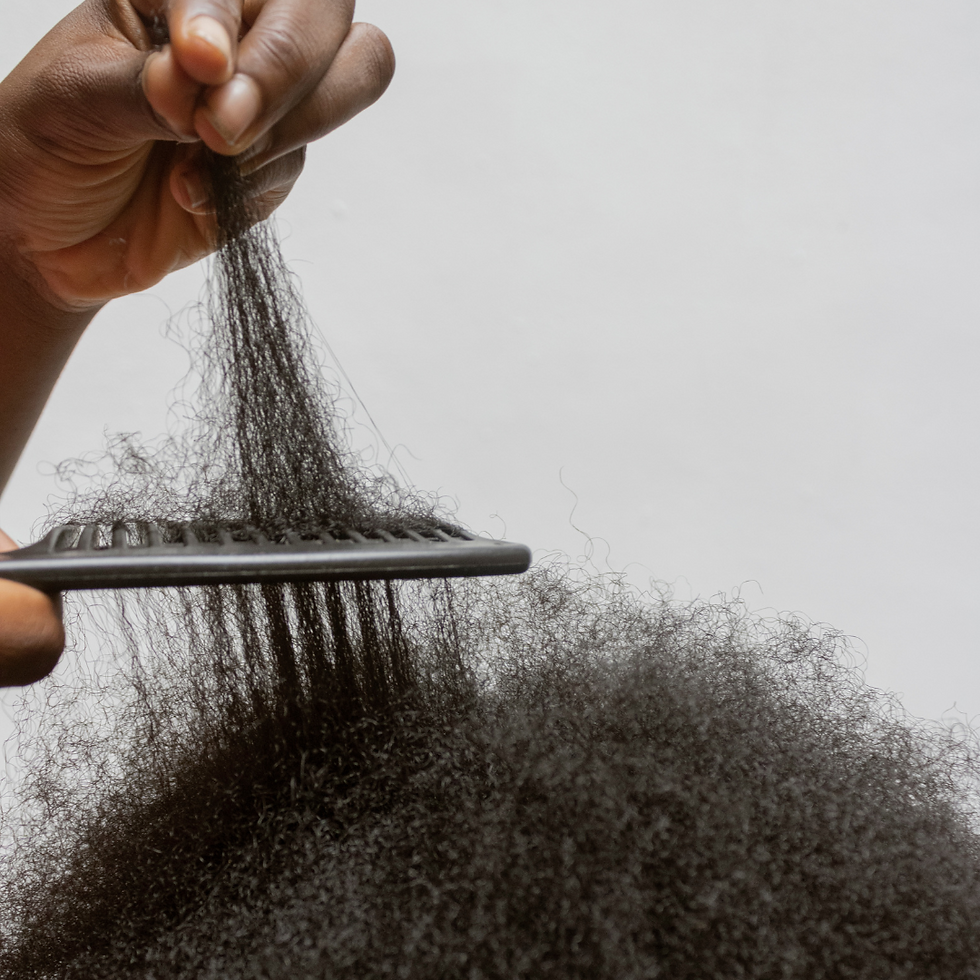Why does your hair thin during Perimenopause and what can you do to stop it?
- Monigho Griffin

- Dec 10, 2022
- 3 min read
It is not enough that you may have difficulty in sleeping, hot flushes , night sweats, or even weight gain during perimenopause, but now you have to deal with thinner hair!
You dislike the fact that your partings are wider, your afro is thinner, and your ponytail has become a pigtail!
Our hair is regarded as our 'crown of beauty' so any changes in your hair due to perimenopause , which adjusts the way you look is like having an another nail in the coffin of your youth!
So what cause thinner hair during Perimenopause , how can you stop it and how can you keep your hair healthy?

Why does your hair get thinner during Perimenopause?
Hair grows in cycles.
In the resting phase of your hair growth cycle, you would normally lose an average of 50-100 strands per day.
This hair is being replaced by new hair, so no hair loss is noticeable to you.
During perimenopause, your hormones (progesterone, estrogen, testosterone) either fluctuate or are on the decline.
The decline of estrogen makes testosterone (regarded as the male hormone) to be more dominant, tell-tale signs of this would be hair growing on your chin and thinning hair.
What is reassuring is that the dominance of testosterone will thin your hair but will not cause you to go bald, during Perimenopause.
Every person’s perimenopause journey is unique, but thinning hair will only occur if you have a genetic disposition for it.
If you have thinning hair can your hair back grow back?

*Yes* according to Lorna jones, Trichologist at Caring for hair
If the hair follicles are still there are remedies you can take to produce stronger or thicker hair, but you may have to use these products all the time”
These include over-the-counter products, plus many private therapies which are offered by trichologists, and hair transplants.
See the full video here on Hair before after, during Menopause, https://youtu.be/kzm7jdZc86U
5 steps you can take to look after your hair during Perimenopause?
1. Don’t Stress
Stress can contribute to the imbalance of hormones. The higher cortisol levels (stress hormone) triggers testosterone hormone making it more dominant and resulting in thinner hair.
2. Sleep
Sufficient sleep helps to repair and renew your body. It also helps to regulate your hormones so view it as a necessity and not as a luxury.
3.Nutrition

A diet rich in phytoestrogens. These plant estrogens, act like estrogen in your body and help to raise the levels.
This can be food substances like fruit and vegetables i.e., soya milk, soya products sesame seeds flax seeds pomegranates apples cranberries carrots, and berries for
4. Exercise
Regular exercise helps with menopause symptoms generally, but it is also important to bear in mind that when you exercise blood circulation increases, allowing for more nutrients and oxygen to get to your hair follicles, this encourages hair growth by extending the growth cycle of your hair.

5. Hair Care
You need to hydrate internally and externally. So, it is vital to drink lots of fluids during the day. Avoid caffeine alcohol and fizzy drinks as much as possible.
To maximize the hydration externally avoid shampoos with sulphates as they are drying to your hair. Also, reduce use of hot hair irons and blow-drying.
Is your hair is frizzy or lost its shine?
Use an absorbing and moisturizing natural oil like Pure Shea oil either on your hair when it is wet or dry. You can also use it prior to putting condtioner for extra softness
Conclusion
Hormonal fluctuation means that if you are genetically disposed to it, your hair can thin during Perimenopause.
There are many solutions you can use to reverse this, so you can choose to have thicker hair despite Perimenopause.




Comments